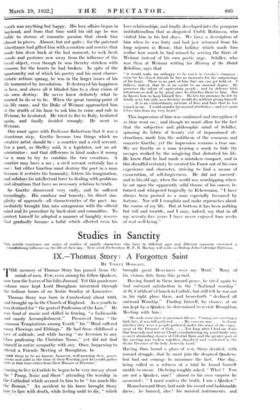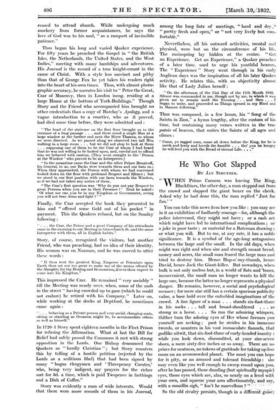Studies in Sanctity
This article continuos our series of studies of saintly characters who have in different ages and different manners exercised a transtoraiing influence on the life of their day. Next week Prebendary H. F. B. Mackay will write on Bishop John Coleridge Pat bison.
IX.—Thomas Story : A Forgotten Saint
By VIOLET liODEKIN frIlE memory of Thomas Story has passed front the 1 minds of men. Few, even among his fellow-Quakers, now turn the leaves of his folio Journal. Yet this ponderous volume once kept Lord Brougham interested through the tedious hours of an Assize Sunday at Lancaster.
Thomas .5tory was horn in Cumberland about BM, and brought up in the Church of England. As a youth he was destined for " the genteel Profession of the Law." He was fond of music and skilled in fencing, "a fashionable and manly Accomplishment." Preserved from " the common Temptations among Youth " his " Mind suffered many Flowings and Ebbings." He had from childhood a love of solitude, and while having " no Aversion to any Class professing the Christian Name," yet did not find himself in entire sympathy with ally. Once, happening to attend a Friends Meeting at Broughton, lie —teak them to be an honest, Innocent, well-meaning Sect, grave, serious and solid in the time of their Worship; [yet he] could gather 'ittle at that time either from their Manner or Doctrine."
Coming to live in Carlisle lie began to be very uneasy about the " Pomp, Noise and Show" attending the worship, in the Cathedral which seemed to him to be " too much like the Roman:" An 'accident to his horse brought Story face to face with death, while feeling unfit to die, " which brought great Heaviness over my !Mind.- Many of his visions date from this period.
Having found in them inward peace, he tried again to find outward sat isfactii in in the "National worship at St. Cuthbert's Chino-11 in Carlisle, but still felt he was not in his right place thcre, and henceforth " declined all outward Worship." Finding himself, by chance, at an inn kept by a Quaker, he determined to revisit. Broughton Meeting with hint :
We rode some time in profound Silence. (' g into meeting in
little late, it was full gathered. . . . My concern was . . to know whether they wore a people gathered under the sense of the enjoy- ment of the Presence of God. . . . Not long after I had sat dOWII that heavenly and watery Cloud overshadowing my mind brake iithi• a sweet abounding shower of Cele,t ial Rain and the emote,. part. of the meeting was broken together. dissolved and comforted in the divine Presence of the holy, hen dy Lord."
Having thus found a place of rest. Story decided, with inward struggle, that he must join the despised Quakers, but had not courage to aonounce the fact. One day. being called as a witness at a trial he found himself unable to swear. On being roughly asked, " What ?. You arc not a Quaker, sure!" almost to his own surprise he answered : " I must confess the truth, I am a Quaker." .
Henceforward Story laid aside his sword and fashionable. dress ; lie burned, alas ! his musical instruments, and
ceased to attend church. While undergoing much mockery from former acquaintances, he says the love of God was to his soul, " as a rampart of invincible patience."
Thus began his long and varied Quaker experience. For fifty years he preached the Gospel in " the British Isles, the Netherlands, the United States, and the West Indies," meeting with many hardships and adventures. His Journal is the record of a true knight-errant in the cause of Christ. With a style less succinct and pithy than that of George Fox he yet takes his readers right into the heart of his own times. Thus, with almost photo- graphic accuracy, he narrates his visit to " Peter the Great, Czar of Muscovy, then in London incog. residing at a large House at the bottom of York-Buildings." Though Story and the Friend who accompanied him brought no other credentials than a copy of Barclay's Apology, and a vague introduction to a courtier, who as it proved, had died some time before, they were admitted and :
"The head of the staircase on the first floor brought us to the entrance of a long passage . . . and there stood a single Man at a large window at the further end next the River Thames, to whom we were directed. As wo passed along we observed two tall Men walking in a large room . . . but we did not stop to look at them . supposing one of them to be the Czar of whom Iliad heard that he was not willing to be looked upon, and, careful not to offend him we behaved with caution. [They went straight to the Person at the Window' who proved to be an Interpreter.] e In the meantime came the Czar and the other Prince Menzicoff, his General, to us, our Backs wore towards them and our hats on : When they approached, the Person with whom we had conversed looked down on the floor with profound Respect and Silence ; but we stood in our first position with our faces towards the Window, as if we had not taken any notice of them.
"The Czar's first question was 'Why do you not pay Respect to great Persons when you are in their Presence ? ' Next he asked: ' Of what use can you be in any Kingdom or Government, seeing you will not bear Arms and fight'!" "
Finally, the Czar accepted the book they presented to him and " offered some Gold out of his pocket " in payment. This the Quakers refused, but on the Sunday following : " . . . the Czar, the Prince and a great Company of his attendants came in the morning to our Meeting in GracechurchSt. and the same Interpreter with them, all in English habits."
Story, of course, recognized the visitors, but another Friend, who was preaching, had no idea of their identity. His sermon was on Naaman, and he was moved to utter these words : " If thou wart the greatest King, Emperor or Potentate upon Earth thou art not too great to make use of the means offered by the Almighty for thy Healing and Restoration, if ever thou expect to come into his Kingdom."
This impressed the Czar. He remained very sociably " till the Meeting was nearly over, when, some of the mob in the street " having crowded up to gaze (which he could not endure) he retired with his Company." Later on, while working at the docks at Deptford, he sometimes came again : " . . . behaving as a Private person and very social, changing seats, sitting or standing as Occasion might be, to accommodate others as well as himself."
In 1720-1 Story spent eighteen months in the Fleet Prison for refusing the Affirmation. What at last the Bill for Relief had safely passed the Commons it met with strong opposition in the Lords. One Bishop denounced the Quakers as " hardly Christian " ; but Story counters this by telling of a hostile petition (rejected by the Lords as a seditious libel) that had been signed by many " bogus Clergymen and Threepenny Curates,' who, being very indigent, say prayers for the richer sort for 3d. a time, which is paid Twopence in farthings and a Dish of Coffee."
Story was evidently a man of wide interests. Would that there were more records of them in his Journal,
among the long lists of meetings, " hard and dry ,', " pretty fresh and open," or " not very lively but cern- fortable."
Nevertheless, all his outward activities, mental and physical, were but on the circumference of his life: The mainspring lay hidden at the centre. " Get an Experience. Get an Experience," a Quaker preacher of a later time; used to urge his youthful hearers. The " Experience " Story went through in his early Anglican days was the inspiration of all his later Quaker activity. He relates this, with an objectivity almost like that of Lady Julian herself : " On the afternoon of the 21st Day of the 11th Month 16119, 'Silence was commanded in me, though not bime, in which it was given me to remain 'until the Evening . . . and then . .. I began to write, and proceeded as Things opened, in my Mind and in Manner following."
Thus was composed, in a few hours, his " Song of the Saints in Zion," a hymn lengthy, after the custom of his time, but containing many verses -written in the true patois of heaven, that unites the Saints of all ages and climes :
Come, ye ragged ones, come sit.down before the King, for he is meek and lowly and loveth the humble . . . tho' you be hungry he will feed you with the Bread of eternal Life. . .







































 Previous page
Previous page